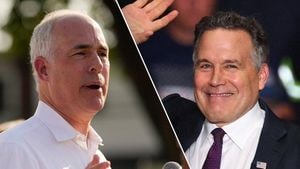The Democratic National Convention (DNC) this year is surrounded by transformative discussions and high-stakes moments as the party navigates its strategy for the upcoming election season. Amid the buzz, former President Bill Clinton has emerged as a prominent voice calling for Democrats to reconnect with voters.
Clinton recently shared his thoughts on MSNBC’s “The Saturday Show with Jonathan Capehart.” He urged the Democratic Party to find more relatable ways to communicate its message, especially as Republicans seem to be gaining traction across various sectors of the government. Providing traditional politicians' perspective, Clinton stated, “Politics is the only business in which you can prove your authenticity by not knowing anything.” This statement reflects his belief about the disconnect many voters feel toward current political rhetoric.
Highlighting the need for dialogue, he stated, “Just go out and talk to people because I think we’re behind.” His comments resonate with growing concerns within the party as it looks for answers following disappointing results in previous elections. Democrats are grappling with strategies to reclaim the trust of voters, particularly those from small towns and rural areas, who have increasingly sophisticated means of obtaining information.
This year, the DNC is particularly significant, occurring against the backdrop of tightening election races. With President Joe Biden facing challenges from multiple fronts, including economic concerns and voter discontent, the convention serves as not only a platform for party unity but also as a necessity for presenting clear and compelling strategies moving forward. Many party insiders fear the consequences of remaining distanced from the working-class narrative.
Clinton’s remarks also align with sentiments expressed by progressive leaders within the party, including Senator Bernie Sanders of Vermont. Sanders has been vocal about the need for the Democratic Party to abandon its elite image. “It should come as no great surprise,” he wrote, “that a Democratic Party which has abandoned working-class people would find the working class has abandoned them.” This statement underlines the urgency for Democrats to realign their priorities and embrace grassroots campaigning.
Compounding these internal debates is Vice President Kamala Harris’s perceived struggle with her economic messaging, which has been criticized for failing to resonate strongly with voters. Some analysts suggest Biden’s extended candidacy complicated Harris’s own campaign efforts, leaving her with minimal time to connect with key demographics. Such criticisms add pressure on the DNC to craft messages during the convention moments of authenticity and resonance.
Meanwhile, the safety of the convention proceedings has also been called to attention. Recently, there was the arrest of Joshua Zimmerman after he was involved in a lengthy police standoff just blocks away from the United Center, the site of the DNC. Zimmerman, allegedly connected to serious criminal charges including murder, was tracked to Chicago from Mississippi where he had escaped custody.
The U.S. Marshals Service confirmed there was “no connection or threat” to the DNC, defusing some immediate public concern. Still, officials underscored the importance of the convention’s safety as it plays host to numerous dignitaries and citizens alike.
The DNC will focus on strengthening party ties, ensuring security and implementing strategic messaging to win back disillusioned voters. The urgent call for Democrats to turn their focus outwards—toward building community relations and addressing constituents' fears—is expected to dominate discussions throughout the convention.
Clinton, along with other Democratic leaders, will seek to set the tone for the DNC by actively engaging with voters' concerns rather than solely focusing on internal dilemmas. The upcoming DNC is pivotal as the Democratic Party faces not only electoral challenges but the pressing social issues affecting its constituents.



